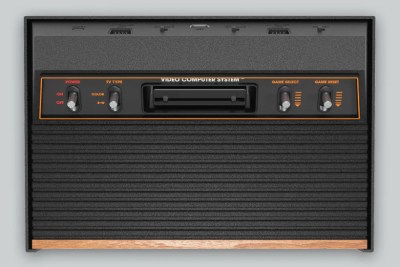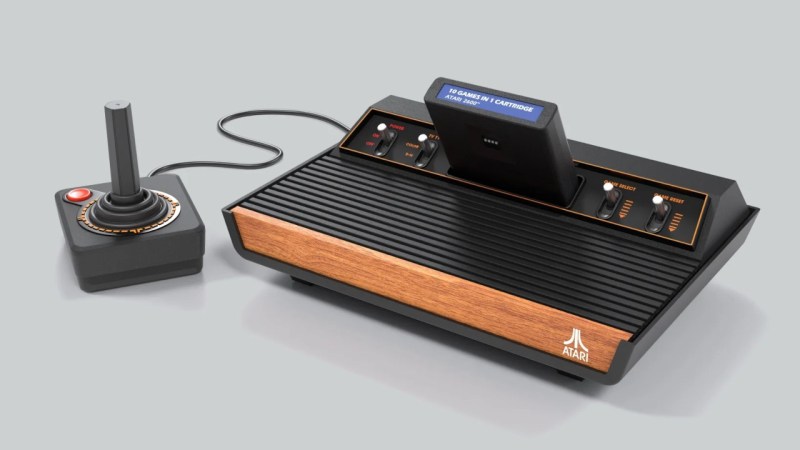Readers of a certain age no doubt remember the Atari 2600 — released in 1977, the 8-bit system helped establish the ground rules for gaming consoles as we know them today, all while sporting a swanky faux wood front panel designed to make the system look at home in contemporary living rooms.
Now, nearly 50 years later, the Atari 2600 is back. The new system, imaginatively named the 2600+, looks exactly like the original system, albeit at around 80% scale. It will also work the same way, as the system will actually be able to play original Atari 2600 and 7800 cartridges. This is something of a surprise when compared to the previously released retro consoles from the likes of Sony and Nintendo, as they were all limited to whatever games the company decided to pack into them. Of course, this probably has something to do with the fact that Atari has been selling newly manufactured 2600 games for some time now.
 Although it will play original cartridges, it’s still an emulated console at heart. There aren’t a lot of technical details on the product page, but it does say the 2600+ is powered by a Rockchip 3128 SoC with 256 MB of DDR3 RAM and 256 MB eMMC flash. Some quick searching shows this to be a pretty common board for set-top gadgets, and wildly overpowered considering the meager requirements for emulating a game console from 1977. We wouldn’t be surprised to find it’s running some kind of minimal Linux install and using one of the existing open source emulators.
Although it will play original cartridges, it’s still an emulated console at heart. There aren’t a lot of technical details on the product page, but it does say the 2600+ is powered by a Rockchip 3128 SoC with 256 MB of DDR3 RAM and 256 MB eMMC flash. Some quick searching shows this to be a pretty common board for set-top gadgets, and wildly overpowered considering the meager requirements for emulating a game console from 1977. We wouldn’t be surprised to find it’s running some kind of minimal Linux install and using one of the existing open source emulators.
While the 2600+ sports the same 9-pin D-sub controller connectors as the original console, it thankfully embraces modern display technology and outputs over HDMI. Each console will come with a “10-in-1” cartridge that contains some of the console’s most popular titles, as well as a modernized version of the original single-button joystick. (Unlike the original, the 2600+ comes with only a single joystick — the other is sold separately.)
Atari won’t start shipping the 2600+ until this fall, but they’re currently taking preorders for the $130 system. We’re eager to see somebody pull it apart, as the earlier “mini” consoles ended up being ripe for hacking.
Thanks to [Rog77] for the tip.
















Oh no… this is a ploy to sell the remaining E.T. game carts, isn’t it?
https://en.m.wikipedia.org/wiki/Atari_video_game_burial
“You know how they do.”–Kenard, The Wire
Nice!
It’s about time, they announced this years ago
Nah…..then it would be 1000 times too much overpowered
That’s cool. I remember seeing $30 consoles at GameStop(Babbages) that had hundreds of the old Atari ROMs on them. It looked like a little six-inch 2600. There was IntelliVision, Nintendo, and ColecoVision ones, too.
No FPGAs harmed in the making.
I’ve been restoring Ataris for 39 yrs now….the HDMI part is ever harder to get by, so new HWW is always welcome
So what’s your point?
A place for everything and everything in its place. Except, this is not the place for *that*.
That’s their point and I agree.
I really don’t get that. It seems like an original article covering a device release announcement. It includes some snark I don’t think any marketing exec would be comfortable on an “ad” piece and even has a slightly negative tone, especially regarding the potential quality of the piece.
I am disappointed that Outlaw will only be available for the US market :-(
I suppose (almost sure) that the NTSC cartridge cannot work on a Pal 2600?
If u want outlaw get a mini game system or a game stick for mini ps1 or super console x or whatever they all have outlaw on them
Oh yes I know but that was to feed some kind of tech-fetishism. 😁
2600+ will play PAL or NTSC. NTSC games usually work in a fashion on a PAL console if the TV supports 60mhz as modern ones do. Colours can be different or black and white
We do ads. They’re in the banners.
Our content is 100% our own. Period.
In case anyone cares, I promise I don’t work for Atari or Supplyframe.
I just thought it was a cool, potentially hackable, toy; so sent it in via the tip line.
I see from my reading that there is still interest in building 2600’s from scratch, emulation, fpga implementation, as well as innovative cartridge design.
Try to enjoy it for what it is.
BTW, I suspect the very first hack will be someone building in a menu and putting all of the known ROMs onto that eMMC…
:-)
I was excited to see it. Maybe not a hack today, but i think it will be a neat platform to experiment with since it is compatible with the original cartridges. It would be possible to even create your own games.
Thsi book seems interesting on that subject: https://www.amazon.com/Making-Games-Atari-2600-Steven/dp/1541021304
Of https://8bitworkshop.com/ game.
(I’m not Steven Hugg either…)
I have seen RP2040 used as a cartridge, but the creator said they didn’t have enough pins on the pico board to add in a SD card, I wonder if that could be fixed by using shift registers and PIO for the address and data lines back to the 2600, as the rp2040 is so much faster?
USB input – Disk on key for games
“While the 2600+ sports the same 9-pin D-sub controller connectors as the original console, it thankfully embraces modern display technology and outputs over HDMI. ”
Sadfully, rather. Pong era games need CRT/NTSC/RF filtering somewhat badly.
On the TV screens of the day, the pixelated figures did blend together, to form a recognizable character.
To name an example, the many racing games and sun set/sun rise patterns.
On a real CRT TV (ideally NTSC) of the time, over RF, these objects looked like real.
The bars of color turned into a gradient, the car looked like a car, not a bunch of solid bars next to each others.
Without filtering, the graphics are wrong. Simply as that.
That’s a form of history revisionism, it should be illegal.
Purists UNITE!
Lol 😆
The problem is, that people nolonger remember how games originally looked&felt.
Either because they’re too young to know or because they forgot.
And that’s just sad, because a bit of pop culture is lost this way.
Sites like mobygames and Wikipedia are no help, either. They merely show the raw video data, not the final image as seen by the players back in the day when it was still in wide use.
If authors of emulators like Stella wouldn’t try their best to preserve the original experience, most people wouldn’t even notice how wrong the current situation is. Or how wrong the media reviews the past over and over.
Many people may still own a real VCS or similar vintage system, but nolonger the TV set from back then.
And it’s not just the visuals, it’s also the controllers and the audio. There are certain “analog” factors that aren’t being replicated by such cheap emulator boxes and flatscreens.
Ironically, a full-fledged emulator on a PC has several filtering mechanisms to compensate adequately. They also allo the use of vintage controllers via homebrew converters (via parallel port, historically) or commercial USB converters.
The BlaargTV effects features are in the emulator. It has to be enabled somehow in the startup sequence of the emulator. They just don’t have it enabled and without say a keyboard and mouse, it is kind of difficult for the end user to do it. So, yes, it could be enabled but they will have to come up with a joystick controllable menu system for Stella and employ it in the menu as a user controlled setup before the emulator starts up the emulation and reading the cartridge and copy it to onboard RAM ( not the emulated RAM space but as ROM space but really using hardware RAM once copied to the emulators VM protected sandbox).
What’s inside a Raspberry PI 2600 emulator ?
I loved my 2600 back in the day, but the joystick design was horrible. I sure hope these are less rigid than the original.
“…as well as a modernized version of the original single-button joystick. (Unlike the original, the 2600+ comes with only a single joystick — the other is sold separately.)”
I had seen elsewhere that paddle controllers would be available, too. (Separately, of course.)
Realize please that the new console is underrated by many posts without realizing the benefits of it at the price. Complaining about one controller is not a problem. Originals work. And there are so many to be found cheap. Just the possibility of homebrews for this, and the vast number of carts that will work, and hdmi for our new tvs. This is a no Brainerd to buy. Add to that the 7800s work on it too. The guts of this new model have more power than the old original internally. Of course your choices are flash systems with no expanding,
Changing the old consoles to, at best composite, or forgetting this all together. The fact that the new partnership is encouraging new higher quality releases that many are just amazing I’d my justification.
It has hackability potential! It has a Micro USB and a reset button on the mobo!